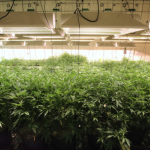Pennsylvania’s commercial medical marijuana program is set to more than double in size.
State officials on Thursday announced the program was entering its second phase, expanding from 12 to 25 cannabis producers and adding 23 more dispensary operators.
The state also is launching a unique research scheme that will run in parallel to the established commercial program, doing clinical investigations into marijuana and selling to the public.
“From what I’ve seen and heard, there seems to be a high interest in doing research around pain management and as a replacement for opioids,” said John Collins, director of the state marijuana program in a phone conference with reporters.
When the commercial program is fully up to speed by late next year, Pennsylvania is expected to have a total of 25 commercial companies growing and processing marijuana into tinctures and vaporizable oils.
And there’ll be up to 150 commercial retail outlets selling it to patients.
The first sales began on Feb. 15, and demand quickly outstripped supply. But those shortages have eased recently. Currently, two commercial producers are shipping medicinal products. Nine retail outlets are actively dispensing, Collins said.
The number of growers and dispensers will further balloon with the launch of the nation’s first state-sanctioned academic research scheme.
Under Pennsylvania’s new research program, eight health systems — medical schools affiliated with an urgent care hospital — will be able to chose a marijuana producer, Collins said.
The research producers not only will be granted a lucrative permit to grow, they’ll be awarded a permit to operate six dispensaries apiece.
(That will take the total number of growers in the state to 33 and dispensaries to 198.)
The health systems are permitted to accept “reasonable remuneration” to set up their research programs from the marijuana companies but are forbidden to solicit gifts from company owners, managers or backers. Charitable contributions made a year before the enactment of the law are exempt.
Pennsylvania has eight major university health systems. The four based in Philadelphia — Drexel, Temple, and Jefferson universities and the University of Pennsylvania — have all expressed interest in conducting research, according to industry insiders. Also eligible are the University of Pittsburgh Medical Center, Geisinger Health, Penn State- Hershey, and Lake Erie College of Osteopathic Medicine.
The health systems will construct research studies focusing on medicinal applications, but will not actually handle the cannabis plant or any of its products. That’s because federal law outlaws marijuana in any form. Handling the drug would jeopardize federal grants and funds flowing from Medicare and Medicaid.
The research dispensaries will enroll patients into those studies. The health systems will analyse the data the dispensaries collect. The dispensaries also will sell marijuana products to patients who are not participating in studies.
The Department of Health will begin to accept applications for commercial and research phase 2 permits on April 5.
Aspiring commercial growers and dispensary operators who lost in the first round are required to apply again and pay application fees — $10,000 for a grow, $5,000 for a dispensary — a second time, said a health department spokeswoman.
The Pa. medical marijuana program by the numbers:
Patients registered with the Pa. program: 25,503
Patients certified by the state: 9,020
Patients who have bought at a dispensary: 6,683
Doctors registered to participate: 866
Doctors who have taken educational course and are approved to write recommendations: 473
(217)





Leave A Reply